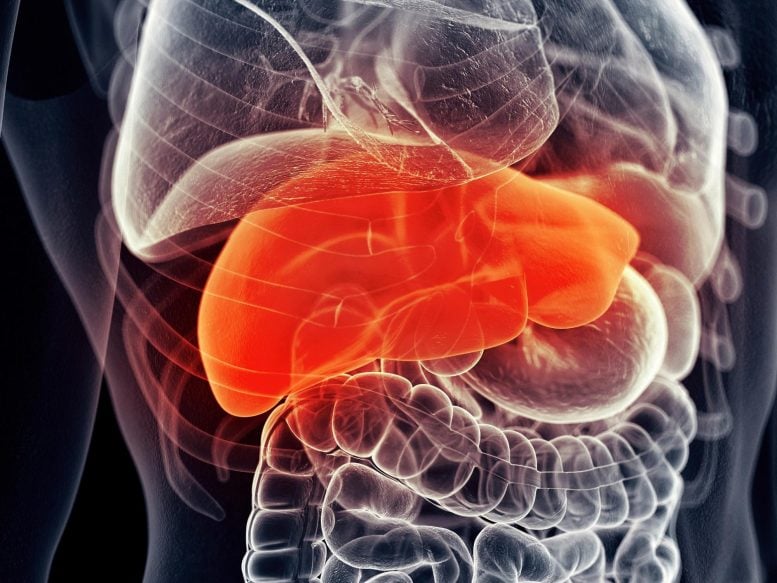
A nationwide study in Sweden indicates that GLP1 agonists, such as Ozempic, could lower the risk of cirrhosis and liver cancer in individuals with type 2 diabetes and chronic liver disease, suggesting a new, effective treatment option for preventing severe liver diseases.
A nationwide study conducted by the Karolinska Institutet in Sweden, published in the journal Gut, indicates that the use of Ozempic and similar GLP1 agonists is linked to a lower likelihood of cirrhosis and liver cancer in individuals with type 2 diabetes and chronic liver disease.
GLP1 agonists like Ozempic reduce blood sugar levels and are mainly used to treat type 2 diabetes. However, as the drug also reduces appetite, it is now increasingly used to treat obesity and has become a popular weight-loss drug.
Reduced risk of liver damage
Results from early clinical trials also suggest that GLP1 agonists may reduce the risk of liver damage. Therefore, researchers at Karolinska Institutet included all people in Sweden with chronic liver disease and type 2 diabetes in a register-based study. They then compared the risk of severe liver damage in those who were treated with GLP1 agonists and those who were not. The results show that those who took the drug for a long period of time had a lower risk of later developing more severe forms of liver disease such as cirrhosis and liver cancer.
According to the researchers, this suggests that GLP1 agonists could be an effective treatment to avoid severe liver disease in people with concurrent type 2 diabetes.
“Fatty liver disease is estimated to affect up to one in five people in Sweden, many of whom have type 2 diabetes, and about one in twenty develop severe liver disease,” says first author Axel Wester, assistant professor at the Department of Medicine, Huddinge, Karolinska Institutet. “Our findings are interesting because there are currently no approved drugs to reduce this risk.”
Many of the people in the study stopped taking GLP1 agonists, resulting in a lack of protective effect. However, those who continued taking their medication over a ten-year period were half as likely to develop severe liver disease.
Need to be confirmed
“The results need to be confirmed in clinical trials, but it will take many years for these studies to be completed,” says Axel Wester. “Therefore, we use existing registry data to try to say something about the effect of the drugs before that.”
A limitation of the method is that it is not possible to control for factors for which there is no data, such as blood tests to describe the severity of liver disease in more detail. However, the researchers have recently built a new database called HERALD where they have access to blood samples from patients in Region Stockholm.
“As a next step, we will investigate the effect of GLP1 agonists in this database,” says the study’s last author Hannes Hagström, consultant in hepatology at the Karolinska University Hospital and adjunct professor at the Department of Medicine, Huddinge, Karolinska Institutet. “If we get similar results, it would further strengthen the hypothesis that GLP1 agonists can be used to reduce the risk of severe liver disease.”
Reference: “Glucagon-like peptide-1 receptor agonists and risk of major adverse liver outcomes in patients with chronic liver disease and type 2 diabetes” by Axel Wester, Ying Shang, Emilie Toresson Grip, Anthony A Matthews and Hannes Hagström, 30 January 2024, Gut.
DOI: 10.1136/gutjnl-2023-330962
The research was mainly funded by Region Stockholm (CIMED), the Swedish Research Council and the Swedish Cancer Society. Hannes Hagström’s research group has received funding from Astra Zeneca, EchoSens, Gilead, Intercept, MSD, Novo Nordisk and Pfizer, although no industry-supported funding was obtained for this specific study.









I just started taking ozempic about 6 months ago and I do have c l and I hope this helps me because I do not want to die young like my father did .he was only 52 and had cirrhosis of the liver badly and died from it .thanks for this info mantles me feel so much better about taking ozempic
I have been taking Victoza for less than a year. My AIC was 6.9 and is 5.9. I have lost 40#.. but my liver count went from 20 to 40 and that was concerning to my doctor. I have been on .6 the entire time because I didn’t like the stomach cramps and lack of bm. The .6 has done what I needed and I saw no reason to increase it to the max and cause any side effects. I did reduce it by 20% more and my liver count improved but my AIC went up slightly. I’m back on .6 now. I think it’s the improvement of diet, fluids, probiotics, sleep that will improve liver health and Yes there can be credit to the GLP-1 because that’s what helped me make the change. My doctor said that the dose I was on wasn’t the recommendation and he thought I should go off of it…I said No..it obviously helps if it drops my AIC and 40#. I have 40# more to reach my healthy level. So what, if I can do it on a lower dose and not suffer the side effects, should tell him something about dosing.!! We have created addicts by using doses that are too high and this is no different. I’m a retired surgical nurse and yes, I do have opinions about meds and dosing..lol..